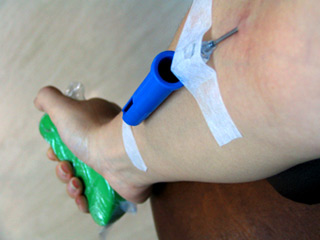Frustration as US refuses to end gay blood ban
 American blood safety officials have refused to act on a recommendation to reduce the lifetime ban on gay men donating blood.
American blood safety officials have refused to act on a recommendation to reduce the lifetime ban on gay men donating blood.
In November, the US Advisory Committee on Blood and Tissue Safety Availability recommended changing the policy to allow gay and bisexual men to donate after a one year period of abstinence from same-sex sexual activity.
The recommendation was expected to be voted on by the Food and Drug Administration’s Blood Products Advisory Committee (BPAC) earlier this month but it’s been revealed that the committee met without deciding on the issue.
Stephanie Yao, an FDA media representative, confirmed to BuzzFeed that there are no plans to address the matter again. She said that the “FDA does not plan to hold another BPAC meeting to discuss this issue.”
She explained that, “[a]lthough advisory committees provide recommendations to the agency, FDA makes the final decisions.”
The 31-year-old ban was first put in place in 1983 in response to the early HIV epidemic which devastated North America’s gay community.
The current policy, adopted in the earliest days of the HIV/AIDS epidemic, and the new recommendation are both simply wrong and can no longer be justified in light of scientific research and updated blood screening technology,” said David Stacy, Government Affairs Director for the Human Rights Campaign (HRC) last month. “It’s far past time for this stigma to end,” he added.
The American Red Cross, America’s Blood Centers, and the American Association of Blood Banks have described the gay blood ban as medically and scientifically unwarranted.
In September, a study found that by lifting the ban on gay and bisexual men donating blood the US could save almost two million lives.
There is a one-year sexual activity blood donation deferral in place for gay men in Japan, Sweden and the UK. In South Africa, there is a deferral for anyone – gay or straight – who has had a new sexual partner in the previous six months.
Leave a Reply